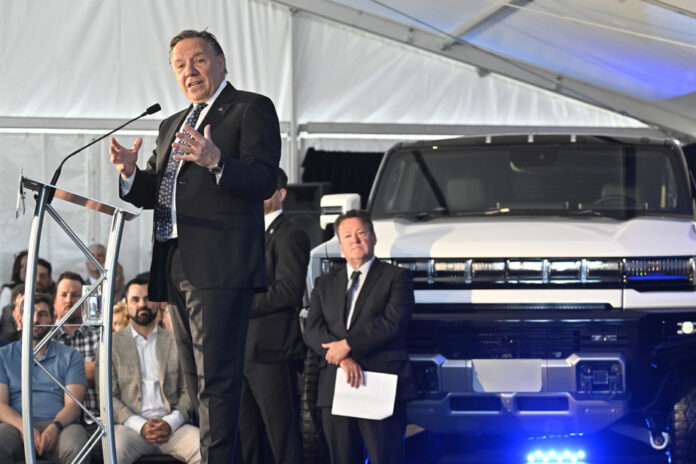(Bécancour) We now have an idea of what to put on the table in subsidies to attract major players in the battery sector: 210 million. While other projects are expected, not everyone will be entitled to the same treatment as General Motors (GM), assure Quebec and Ottawa.
Announced with great fanfare on Monday, the creation of the “Energy Transition Valley”, which brings together the cities of Bécancour, Trois-Rivières and Shawinigan, finally made it possible to learn a little more about the complex envisaged by Ultimum CAM. It is the joint venture formed by the Detroit-based automaker and its partner, the South Korean multinational POSCO.
This factory, which is to manufacture cathode materials – the positive pole of a lithium-ion battery found in an electric vehicle – will cost more than 600 million. Already out of the ground, this complex will be entitled to loans totaling 300 million from the Legault (151.87 million) and Trudeau (147 million) governments.
“We are building a new industry with thousands of paying jobs,” Premier François Legault said at a press briefing. We will create wealth with better paid jobs that will pay more taxes to the Quebec government. The calculation is made on a case-by-case basis. »
The Legault government has turned to the forgivable loan, a tool it advocates, to convince GM and POSCO, who announced their colors a little over a year ago. If thresholds are met in terms of job retention during the decade following the commissioning of the plant, 134 million of the assistance granted by Quebec will turn into a subsidy. For its part, Ottawa is ready to give up half of its loan.
In the Bécancour industrial and port park – the place favored by Quebec to develop the battery industry – heavy artillery had been deployed to confirm the ambitions of the automobile giant as well as the creation of a new zone of ‘innovation.
In addition to the Minister of Economy, Innovation and Energy, Pierre Fitzgibbon, the Federal Minister of Innovation, Science and Industry, François-Philippe Champagne, took part in the event, at such as GM Canada President and CEO Marissa West, POSCO executives, and Republic of Korea Ambassador Woongsoon Lim. The press conference was held at the factory site, along Highway 30.
This will be the first cathode factory to start up in the country. Production is due to start in 2025. Cathodes represent around 40% of the cost of a battery cell. Bécancour’s production will end up in batteries that will power the Chevrolet Silverado EV, GMC Hummer EV and Cadillac Lyriq.
“We continued to negotiate with the governments and our partner after our letter of intent was announced,” Ms. West said, when asked why more than 12 months had passed before confirmation. “There were a lot of things to sort out, but as you can see, that didn’t slow down the build. »
Since last December, GM and its partner have owned land with an estimated 3.75 million square feet (348,189 m2) in the industrial park. From Highway 30, a three-story steel structure is already visible.
The Trudeau and Legault governments have not finished announcing amounts for large companies that come to set up in Quebec. Another multinational, the German chemical giant BASF, has also announced its intention to come and manufacture cathodes in Quebec. Ford should also add to this list.
Added to this are the steps underway to attract a cellier, the missing link in the ecosystem that the Legault government wishes to put in place. Cell manufacturing is the last step before assembling a lithium-ion battery.
The bill for this type of project is generally in the billions of dollars. The purse strings would then have to be loosened. After seeing the Trudeau government offer up to $13 billion in subsidies to Volkswagen for the battery plant to be built by the German multinational in Ontario, Mr. Legault took advantage of Mr. Champagne’s presence to imply that he expected a positive return.
Asked three times whether the Trudeau government was treating Quebec fairly compared to Ontario, Mr. Legault opted for caution.
“We hope so and we will work hard to ensure that Quebec is treated fairly with Ontario,” replied the Prime Minister. Discussions are ongoing, it is too early to respond. »
Moreover, in a context where the volumes of available energy are bound to be limited, a cell manufacturing plant, which requires a lot of energy, could not start overnight, warned Mr. Fitzgibbon. Proponents of such projects will have to be “patient” if they are genuinely interested, he stressed.















